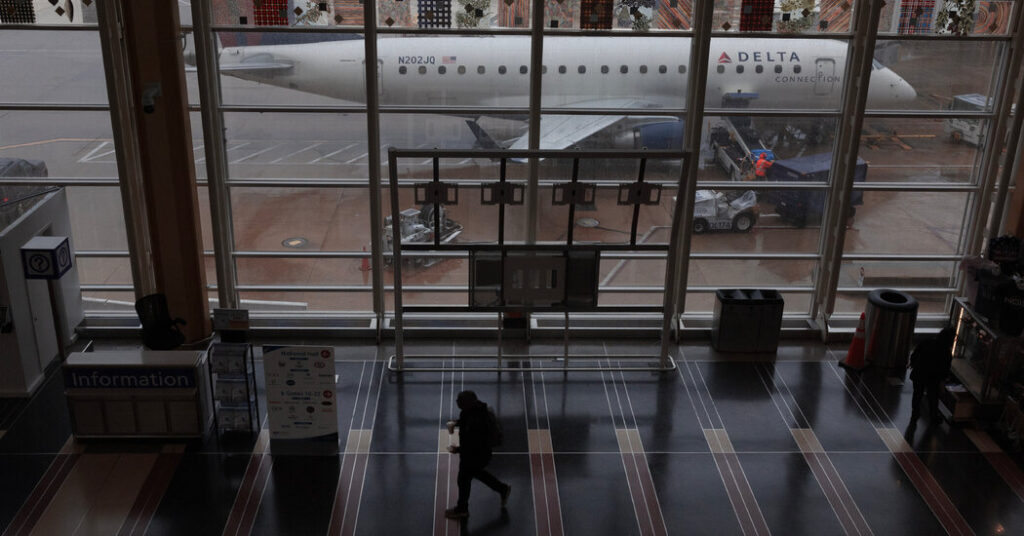The Senate passed a bill Thursday that reauthorizes federal aviation programs for the next five years and introduces new safety measures and consumer protections for passengers amid intense uncertainty and disruption to the air travel system.
The bill, which must receive final approval in the House of Representatives before becoming law, would provide more than $105 billion to the Federal Aviation Administration and another $738 million to the National Transportation Safety Board for airport modernization, technology programs and safety. will provide dollars. It would also strengthen the hiring and training of air traffic controllers, codify airline passenger refund obligations, ensure free family seating, and strengthen protections for passengers with disabilities.
“Aviation safety has become a top priority for millions of Americans these days, and this FAA bill will give Americans the peace of mind they deserve,” said Senate Majority Leader Chuck Schumer of New York. “This is the best Congress can do.” Senate plenary session Thursday evening.
It passed on an overwhelming bipartisan vote of 88-4, just one day before the current law was scheduled to expire. But it is unclear whether senators can reach an agreement to temporarily extend the current law until next week to give the House time to consider the bill.
The bill follows months of bipartisan negotiations by the House and Senate committees that oversee the FAA, after Congress has approved several short-term extensions of the FAA when lawmakers failed to meet early deadlines. It's a compromise. The House passed the bill nearly a year ago on a lopsided vote of 351-69.
Sen. Maria Cantwell of Washington, chair of the Commerce Committee, praised the bill's provisions on consumer protection, aviation safety, air traffic controllers, airport infrastructure and workforce development on the floor after passage.
“This is a huge moment for the aviation industry,” Cantwell said. “We have safety issues and concerns, and we need significant investments. This bill is an investment in safety standards, consumer protection, workforce and technology advancement that will help America It allows us to become the gold standard in the industry.”
“This bill is a strong, bipartisan, bicameral bill that includes hundreds of priorities for Republican and Democratic senators and representatives,” said Sen. Ted Cruz (Texas), the top Republican on the Commerce Committee. It is a regulatory bill.” This bill provides the FAA with necessary safety tools at a critical time. ”
As one of the few remaining bills to be considered essential legislation this year, the FAA package that has sparked several regional conflicts has become a magnet for dozens of amendments and policy riders that threaten to delay the bill's progress in the Senate. became.
Fearing the bill would stall, the House on Wednesday approved a one-week extension before the FAA leaves Washington for the weekend. The Senate was still working Thursday to pass a stopgap measure to give the House time to take up and pass the long-term policy next week, which will be sent to President Biden.
But a protracted dispute threatens to derail that effort, potentially causing the FAA law to temporarily expire. Air travel will not be suspended during the expiration, but the FAA will be required to freeze certain government agency activities, such as air traffic controller training and infrastructure maintenance.
The discussion comes at a time of great uncertainty regarding the aviation system, which has seen a number of worrying incidents in recent days, including dangerous near collisions on runways, aircraft breakdowns, and thousands of flight delays and cancellations. I was disappointed.
For much of Thursday, it was unclear whether the Senate would be able to pass the bill, as senators demanded votes on amendments or threatened to block swift passage. In the end, no amendments were voted on.
The most heated regional battle was over a provision in the bill that would add five long-haul flights from Ronald Reagan National Airport outside Washington. Proponents, including Delta Air Lines, say they want to expand access to the capital and increase competition.
The proposal infuriated lawmakers representing the region, who argued the airport maintains one of the nation's busiest runways and cannot support additional flights. Sens. Tim Kaine and Mark Warner of Virginia and Sens. Benjamin L. Cardin and Chris Van Hollen of Maryland, both Democrats, proposed an amendment to strike new flights. submitted.
Mr. Kaine and Mr. Warner threatened to delay the bill if it did not receive a vote. But Mr. Cruz blocked efforts to propose a compromise that would give the transportation secretary the final say on new flights after considering delays and the impact on passenger safety.
“The Senate has abdicated its responsibility to protect the safety of the 25 million people who fly through DCA each year,” Kaine and Warner said in a statement. “Some of our colleagues were afraid to call the experts. They put the desire for direct flights of a few members of Congress above the safety and convenience of the traveling public. We didn't want to show the American people that we cared about it. It's shameful and embarrassing.”
Only senators from Virginia and Maryland voted against the bill.
Another group of senators failed to vote on a proposal to halt the Transportation Security Administration's expansion of facial recognition technology at airports and limit where it is used.
The senators also proposed a bill to compensate those harmed by the nation's nuclear weapons program, fully fund the replacement of Baltimore's collapsed Francis Key Scott Bridge, a credit card competition measure, and an online A bill to protect minors. None of them made it into the final product.


